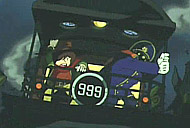
Adieu Galaxy Express 999
Unnecessary sequels seem to be a necessary evil...at least for the companies trying to drain their properties dry. One could argue that the recent Episode 3: Revenge of the Sith was a good sequel that redeemed the previous couple of attempts; however, in most situations, the longer film series go, the worse they get. Some series, like the Rocky films, just go through a gradual decline. Others are so bad that they signal the death knell of once proud franchises (see Star Trek: Nemesis for a prime example).
Galaxy Express 999 was very popular when it was released, and a sequel was quickly commissioned. Under the direction of Rin Taro, we launch into Adieu Galaxy Express 999 with guns blazing, but the film soon shows that there isn't a new story underneath. Although screenwriter Hiroyasu Yamaura worked on the 999 television program, apparently he didn't have enough time to create an original plot for the film, so Adieu borrows liberally from American sci-fi cinema created around the same time (1981). It's not absolutely terrible, but it manages to be one of the worst entries in the animated Leiji Matsumoto universe.
Tetsuro is back on Earth, and the war between mechanical androids and humans has reached a fever pitch. Tetsuro is a freedom fighter now, and his heroism is on display in what turns out to be an amazingly good opening twenty minutes. A mysterious stranger brings him a message supposedly from Maetel, begging him to come back to Galaxy Express Three-Nine. The train supposedly is out of service, but as Tetsuro can see in the distance, the train is very much running, and his quest to make the train is easily the best part of the film.
Once he reaches 999, he meets the old conductor, as well as a new mechanoid galley girl whose brusque demeanor towards humans makes her an odd fit. Nevertheless, the adventure continues as Tetsuro meets up with Maetel and the Express stops at points along its way to Grand Andromeda. Tetsuro meets lots of new folks including Meowdar, who informs him that Maetel is rumored to have taken her mother's place as Promethium, which means she cannot be trusted. He also meets the Black Knight Faust, a once-honorable warrior whose destiny is intertwined with Tetsuro's. As expected, everything hits the fan once Tetsuro learns the true nature of the mechanoid race's plans.
Rin Taro got a whole lot of money to throw onto the screen with Adieu. For a film from 1981, it looks great. The backgrounds are extensive and even beautiful at times for their style. The characters have never looked better. And talk about action scenes! Adieu is actually too jam-packed with action. All of it is wonderfully rendered, though, and even a jaded fan like myself can't help but appreciate what he does with the first twenty minutes. It's densely written and scripted, and Rin Taro pulls it off.
Unfortunately, the demon that haunts all sorts of Rin Taro productions from X/1999 to The Dagger of Kamui is present here -- the lack of a decent editor. Honest to goodness, I have rarely been as bored through so much action as what's in Adieu! Unlike the first film, everything is in motion all the time. The problem is that most of it is unnecessary. Despite the lack of a new storyline, Rin Taro could have succeeded in making a pretty entertaining 1:25 movie. Instead, with a run time of 2:05, parts are downright painful to sit through. (I actually took a break at the hour mark to make sure I didn't fall asleep.) I don't need to watch a minute of 999 pulling away from a planet, nor do I need the constant repetition of plot points. Editing is everything, and Rin Taro just cannot do it.
Meanwhile, the plot is the first movie re-wrapped in different packaging. The underlying metaphor of the first film regarding humanity and its inherent desire for immortality is still here, but it hasn't changed at all. Tetsuro hasn't grown up, and so the effect of his journey into manhood in the first film seems muted. Even the cameos from other members of the Matsumoto universe are strangely unaffecting. With some minor details changed, this is the first movie, only in "lite" form. And this becomes very problematic -- when they start killing off characters near the end, you really don't care.
What really destroys the mood, though, are the blatant ripoffs from other science fiction films of the time. (And if you really want to see this film, skip the rest of this paragraph, since even my mentioning of the other films could be considered spoilers in this case.) Faust's costume is strikingly reminiscent of Darth Vader's...and that's not the only plot device they take from The Empire Strikes Back. The score, which is actually much better than the first film's, has hints of John Williams (most notably Superman) floating around at times. There's even a situation that had me quote the overacting Charlton Heston in Soylent Green. This movie is reminiscent of many others without ever establishing an identity of its own.
Perhaps you can forgive Rin Taro's excesses and still enjoy this film. Adieu Galaxy Express 999 has its pleasures, particularly in its first 20 minutes. But what I wouldn't give for a "Phantom Edit" of this movie! It would have been so much better had it been chopped down to size and given room to be its own film rather than a forced sequel. For now, I'll have to content myself with something else -- something better -- from Leiji Matsumoto instead.
Adieu Galaxy Express 999 -- violence -- C+

